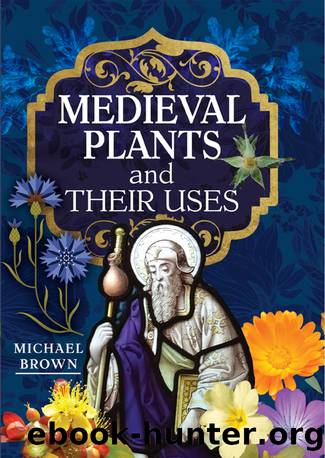Medieval Plants and Their Uses by Michael Brown;

Author:Michael Brown;
Language: eng
Format: epub
Tags: NATURE / Plants / General
Publisher: Casemate Publishers & Book Distributors, LLC
Published: 2023-05-30T00:00:00+00:00
Primroses have long been known as a harbinger of spring and all parts of the plant are edible, making them a useful food plant early in the year. The medieval English song, Maid in the Moor Lay, tells of a maiden who slept out on a moor for a week and a day. She was sustained by primroses and violet flowers with cold spring water as her drink. Protection from the cold was provided by a bower of red roses and lilies. All of the flowers are associated with the Virgin Mary, but the song may be about a humble maiden lost on a moor.
Many plants that we consider to be weeds are simply those plants for which we no longer have a use, and some of them have common names that date from medieval times. Shepherdâs purse gets its name from the shape of the seed cases which resemble a medieval shepherdâs purse; so much so that the name was contemporary even in the medieval period. If you hold the seed stalk at the bottom, the seedcase is similar to the medieval purses shown in illustrations. There are only two seeds, which represent the money in the purse, because shepherds were not wealthy! The main use of the plant was to staunch blood flow. As it is a common weed in fields and gardens, and can be found during most of the year, it was easily found if you were suffering from a bad cut when working in the fields. It also has a medieval name of toothwort to cure toothache, probably because the seedcases also appear vaguely like a tooth.
The primrose heralded the arrival of spring.
Download
This site does not store any files on its server. We only index and link to content provided by other sites. Please contact the content providers to delete copyright contents if any and email us, we'll remove relevant links or contents immediately.
| Administration & Medicine Economics | Allied Health Professions |
| Basic Sciences | Dentistry |
| History | Medical Informatics |
| Medicine | Nursing |
| Pharmacology | Psychology |
| Research | Veterinary Medicine |
The Immortal Life of Henrietta Lacks by Rebecca Skloot(4309)
An American Plague by Jim Murphy(3658)
The Emperor of All Maladies: A Biography of Cancer by Siddhartha Mukherjee(2961)
The Gene: An Intimate History by Siddhartha Mukherjee(2954)
The Fate of Rome: Climate, Disease, and the End of an Empire (The Princeton History of the Ancient World) by Kyle Harper(2912)
Rebecca Skloot by The Immortal Life of Henrietta Lacks(1898)
Stiff - The Curious Lives of Human Cadavers by Mary Roach(1750)
The Great Influenza by John M Barry(1725)
The Vaccine Race by Meredith Wadman(1569)
Undue Risk by Moreno Jonathan D.;(1533)
Three Cups of Tea by Greg Mortenson(1528)
The Mystery of the Exploding Teeth by Thomas Morris(1496)
Hero by Michael Grant(1496)
Quackery by Lydia Kang(1492)
Autism's False Prophets by Paul A. Offit(1459)
A Journal of the Plague Year (Oxford World's Classics) by Daniel Defoe(1448)
Steroids: History, Science, and Issues by Standora Joan E.; Bogomolnik Alex; Slugocki Malgorzata(1436)
Extremes: Life, Death and the Limits of the Human Body by Fong Kevin(1434)
The Vaccine Court by Rohde Wayne(1420)
